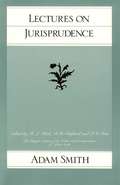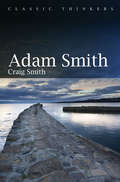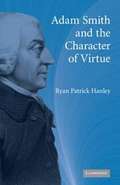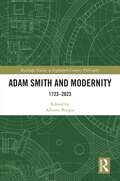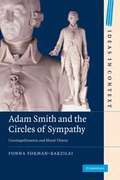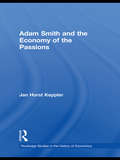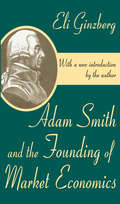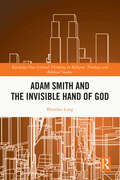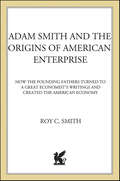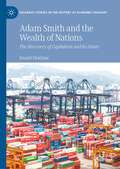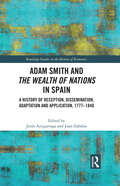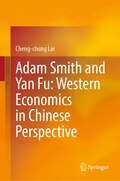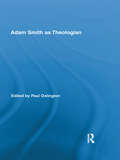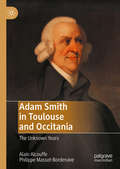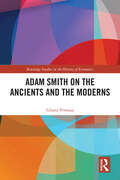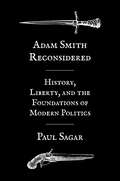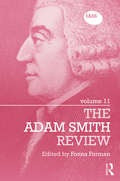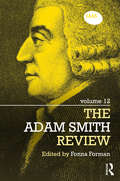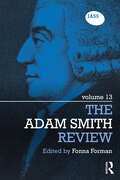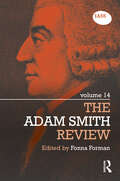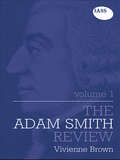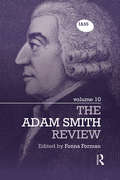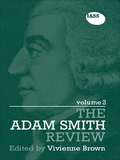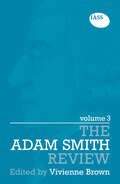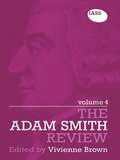- Table View
- List View
Adam Smith: Lectures on Jurisprudence
by Adam Smith R. L. Meek D. D. Raphael P. G. SteinSmith's Lectures on Jurisprudence, originally delivered at the University of Glasgow in 1762-1763, present his "theory of the rules by which civil government ought to be directed. " The chief purpose of government, according to Smith, is to preserve justice; and "the object of justice is security from injury. " The state must protect the individual's right to his person, property, reputation, and social relations. Building on his Theory of Moral Sentiments, Smith argues that the state must act as an impartial spectator, judging when an individual has been injured. The state must then design and apply civil and criminal laws to prevent further injuries and punish transgressors. Laws are also the means by which the state promotes public prosperity. Thus, regulations concerning trade, commerce, and production must be crafted so as to encourage rather than interfere with our productive capacities.
Adam Smith: A Primer (Classic Thinkers)
by Craig SmithAlmost everyone has heard of Adam Smith, founding father of modern economics and author of Wealth of Nations. There is, however, much more to him than this. This new introduction gives a crystal clear overview of the entirety of Smith’s thought. It demonstrates how Smith’s economic theories fit into a larger system of thought that encompasses moral philosophy, philosophy of science, legal and political theory, and aesthetics. Examining the central arguments of his major works, ranging from The Theory of Moral Sentiments to his lectures on jurisprudence and beyond, Smith’s thought is explained in its full intellectual and historical context. As the book unfolds, the long-standing caricature of Adam Smith as an uncritical defender of capitalism red in tooth and claw is systematically challenged, revealing a far more complex and nuanced figure whose rich legacy remains highly relevant today. Comprehensive yet concise, this book will be the leading introduction to Adam Smith’s ideas for generations of students, scholars and general readers, relevant to areas ranging from philosophy and the history of economic thought to political theory.
Adam Smith And The Character Of Virtue
by Ryan Patrick HanleyRecent years have witnessed a renewed debate over the costs at which the benefits of free markets have been bought. This book revisits the moral and political philosophy of Adam Smith, capitalism's founding father, to recover his understanding of the morals of the market age. In so doing it illuminates a crucial albeit overlooked side of Smith's project: his diagnosis of the ethical ills of commercial societies and the remedy he advanced to cure them. Focusing on Smith's analysis of the psychological and social ills endemic to commercial society - anxiety and restlessness, inauthenticity and mediocrity, alienation and individualism - it argues that Smith sought to combat corruption by cultivating the virtues of prudence, magnanimity, and beneficence. The result constitutes a new morality for modernity, at once a synthesis of commercial, classical, and Christian virtues and a normative response to one of the most pressing political problems of Smith's day and ours. Ryan Patrick Hanley is Assistant Professor of Political Science at Marquette University. His research in the history of political philosophy has appeared in the American Political Science Review, the American Journal of Political Science, the Review of Politics, History of Political Thought, the European Journal of Political Theory, and other academic journals and edited volumes. He is also the editor of the forthcoming Penguin Classics edition of Adam Smith's Theory of Moral Sentiments, featuring an introduction by Amartya Sen, and a co-editor, with Darrin McMahon, of The Enlightenment: Critical Concepts in History.
Adam Smith and Modernity: 1723–2023 (Routledge Studies in Eighteenth-Century Philosophy)
by Alberto BurgioThis volume features 19 original essays on Adam Smith’s conception of modernity. The contributions demonstrate the relevance of Smith as the great interpreter of modernity 250 years after the publication of The Wealth of Nations. The chapters in Part 1 focus on structural aspects of Smith’s work. They cover topics such as Smith as theorist of spontaneous order, the systematic dimension of Smith’s theoretical construction, and Smith’s role as a historian of economic thought. Part 2 addresses Smith’s conception of modern subjectivity between Lectures on Rhetoric and Belles-Lettres, Theory of Moral Sentiments and Wealth of Nations. Here the contributors consider the figure of the Smithian "merchant" and the importance of ridicule and satire for understanding modern civility, and comment on the role of sympathy, imagination and moral judgement in developing a sense of self, the condition of the modern man in society, and the virtue of self-command. Part 3 focuses on the crucial question of the relationship between ethics and economics discussing the link between efficiency, equity and justice, the nature of Smith's theory of value, and the ethical connotation of Smith's critique. Part 4 deals with topics inherent to the functional dynamics and development process of the Smithian "commercial society". These topics include law and authority, the relationship between work and freedom, the parable of the "poor man’s son", and the economic and political consequences of the new secular orthodoxy. Finally, the chapters in Part 5 explore themes related to history and the Smithian idea of progress. They focus on the link between trade and progress of civilization, Smith’s modern sociological vision of mass commercial societies, Smith's judgment on “savage” and premodern societies, and the controversial question of the immanentistic or providentialist perspective from which Smith considers both the social dynamics and the historical process. Adam Smith and Modernity will appeal to scholars and advanced students on 18th-century philosophy, the history of economic thought, and the history of social and political philosophy.
Adam Smith and the Circles of Sympathy: Cosmopolitanism and Moral Theory
by Fonna Forman-BarzilaiA broad-ranging study of Smith's views on moral judgement, humanitarian care, commerce, justice and international law.
Adam Smith and the Economy of the Passions (Routledge Studies In The History Of Economics Ser. #116)
by Jan Horst KepplerThe fertility of Adam Smith’s work stems from a paradoxical structure where the pursuit of economic self-interest and wealth accumulation serve wider social objectives. The incentive for this wealth accumulation comes from a desire for social recognition or "sympathy" – the need to recognise ourselves in our peers – which is the primary incentive for moderating and transforming our violent and egotistical passions. Adam Smith thus examines in detail the subliminal emotional structure underlying market behaviour. This new book by Professor Jan Horst Keppler presents an Adam Smith for the 21st century, more sceptical, searching and daring than he has ever been portrayed before. Without disputing its benefits, Professor Keppler’s original contribution explores the anarchic passions constantly threatening to destroy all social bounds, and how the overarching "desire for love" and social recognition provides the Smithian individual with the incentive to transform his unsocial passions into a desire for social advancement and economic wealth with the view to gaining the vital approbation of his peers. One of the most striking results of this new reading of Adam Smith is the latter’s insistence on the primacy of exchange value over use value. In other words, the quest for wealth is exclusively driven by the value it represents in the eyes of others rather than by any value in individual use. At a moment of crisis, where the link between "true" economic values and "virtual" financial values is more fragile than ever, Adam Smith’s work is a profoundly contemporary reminder that in the absence of personal, ethical groundings our economic actions are only grounded in the game of mirrors we play with our peers. This book will be of interest to postgraduate students and researchers in the History of Economics, or indeed any reader with an interest in the psychological foundations of a market economy and its theoretical representations as developed by Adam Smith.
Adam Smith and the Founding of Market Economics
by Eli Ginzberg"Business is a necessary evil that the moral leaders of mankind have tolerated but never condoned. At no time did they view with favor the pursuit of material gain. The Old Testament prophets proclaimed against the rapacity of the rich. Jesus scorned the money lenders. Luther had no kind words to say to the wealthy, nor did Calvin indulge the new bourgeoisie." Thus begins this fi rst book-length study of social philosopher and political economist Adam Smith's The Wealth of Nations. Adam Smith (1723-1790) was a Scottish-born thinker who served as both professor of logic and professor of moral philosophy at Glasgow University. While the publication of his philosophic treatise The Theory of Moral Sentiments at age thirty-six gave Smith fame, The Wealth of Nations, published in 1776, has established his lasting reputation. Recognized in its own day as an important and compassionate examination of economics, the book was praised by Thomas Jefferson for its contribution to the fi eld of economics. Smith wrote The Wealth of Nations for several reasons: he was disgusted with the business methods practiced by merchants and manufacturers, and he was concerned with improving the well-being of society. Refl ecting his own concerns about the contribution economics could make to the betterment of society, Eli Ginzberg published this study of Smith's humanitarian views on commerce, industrialism, and labor. Written for his doctoral degree at Columbia University, and originally published as The House of Adam Smith, the book is divided into two parts. The fi rst part reconstructs and interprets Smith's classic The Wealth of Nations, while the second part examines Smith as the patron saint and prophet of the successes of nineteenthcentury capitalism. Adam Smith and the Founding of Market Economics is a fascinating study, and contributes signifi cantly to our understanding of capitalism, free trade, the division of management and labor, and the history of world economics in the ninete
Adam Smith and the Invisible Hand of God (Routledge New Critical Thinking in Religion, Theology and Biblical Studies)
by Brendan LongThis book contributes to the ‘new view’ reading of Adam Smith, providing a historically and contextually rich interpretation of Smith’s thought. Smith built a moral philosophy on the foundations of a natural theology of human sociality. Examination of his life, relationship with David Hume and use of divine names shows that he retained a progressive form of Christian theism. The book interrogates the metaphor of the ‘invisible hand’ and highlights the importance of the religious dimension of Adam Smith’s thought for his moral philosophy, his jurisprudence and his economics. It reflects on the contemporary relevance of a theological reading of Smith and lays the ground for further inquiry between economic and religious perspectives.
Adam Smith and the Origins of American Enterprise
by Roy C. SmithAdam Smith was a Scottish professor of moral philosophy. He published his classic The Wealth of Nations in 1776, the year the American Revolution began. Smith became widely known for his ideas of free markets, laissez-faire commerce, and the "invisible hand." Yet English politicians, landed gentry, and the nobility paid little attention and enacted none of Smith's suggested reforms.The American colonies, however, began their existence as an independent nation in 1781 with no money, no industry, no banks, and deep in debt. The Founding Fathers-particularly Alexander Hamilton, James Madison, and Benjamin Franklin-turned to the ideas of Adam Smith to create and jump-start an economic system for America with both immediate and long-sustained results.This little-known but vital part of U.S. history is now revealed in Roy C. Smith's highly readable new book.
Adam Smith and the Wealth of Nations: The Discovery of Capitalism and Its Limits (Palgrave Studies in the History of Economic Thought)
by Daniel DiatkineThis book examines the work of Adam Smith and his interest in the science of the legislator. Smith’s criticism of the mercantile system and the political dimension of capitalism is discussed, alongside insight into what institutions he saw as necessary to transform the mercantile system into a system of natural freedom. Through insights into Smith’s analysis of the political threats of capital accumulation and the growth of inequality, the point at which he discovered capitalism is highlighted. This book aims to explore Smith’s belief set out in The Wealth of Nations that the mercantile system was a viable, if dangerous, economic model. It is relevant to students and researchers interested in the history of economic thought.
Adam Smith and The Wealth of Nations in Spain: A History of Reception, Dissemination, Adaptation and Application, 1777–1840 (Routledge Studies in the History of Economics)
by Jesús AstigarragaAdam Smith’s An Inquiry into the Nature and Causes of the Wealth of Nations was the product of the rich tradition of the Scottish Enlightenment but the book’s fame immediately spread across the whole of Europe. This book looks at the long journey of Smith’s ideas from Scotland to peninsular Spain, reconstructing in detail the reception, adaptation, interpretation, and application of Smith's central concepts from 1777 up to 1840. In light of methodological advances during the last two decades in the history of economic thought and the studies on the late Spanish Enlightenment and early Liberalism, the book tackles a series of significant issues and gaps in the historiography. In particular: this book sheds new light on the role of France as an intermediate step as the ideas spread from Britain southwards; the analysis draws not just on translations but also handwritten materials, book reviews, syntheses, summaries, plagiarism and rebuttals; a wide range of methods of dissemination are considered including the printing press and periodicals, parliamentary debates, academic chairs and societies; the role of individual translators and agents is given due prominence; the political interpretations of the Wealth of Nations and the ways in which the book was incorporated into the work of Spanish economists in the decades following publication are also considered. This book marks a significant contribution to the literature on the reception of Smith’s Wealth of Nations, studies of the Spanish Enlightenment and history of economic thought more broadly.
Adam Smith and Yan Fu: Western Economics in Chinese Perspective
by Cheng-chung LaiThis book examines at a static level how Adam Smith's The Wealth of Nations (1776) was introduced into China at the turn of the twentieth century. In a dynamic socio-economic context, Yan Fu (1854-1921) had The Wealth of Nations in mind as a prescription for China's "Wealth and Power". This book aims answer the question of whether The Wealth of Nations, a book which advocates laissez-faire, free trade, and minimum governance helpful for China with very different economic conditions and modes of thought to the West and goes on to reexamine Yan Fu's economic ideas through a modern economics perspective.
Adam Smith as Theologian (Routledge Studies in Religion)
by Paul OslingtonAdam Smith wrote in a Scotland where Calvinism, Continental natural law theory, Stoic philosophy, and the Newtonian tradition of scientific natural theology were key to the intellectual lives of his contemporaries. But what impact did these ideas have on Smith’s system? What was Smith’s understanding of nature, divine providence, and theodicy? How was the new discourse of political economy positioned in relation to moral philosophy and theology? In this volume a team of distinguished contributors consider Smith’s work in relation to its Scottish Enlightenment religious background, and offer stimulating theological interpretations of his account of fallible human nature, his providential account of markets, and his invisible hand metaphor. Adam Smith as Theologian it is a pioneering study which will alter our view of Smith and open up new lines of thinking about contemporary economics.
Adam Smith in Toulouse and Occitania: The Unknown Years
by Alain Alcouffe Philippe Massot-BordenaveThis book provides substantial background on what Adam Smith did during his stay in Toulouse and the Languedoc region of France during the 18th century. This is a crucial period in Smith’s life for at least two reasons: i) it is during this time that Smith began to work on The Wealth of Nations; and ii) it is generally understood that although some of his ideas about political economy were already formed before his trip, his encounters with many French political economists during his time in France helped him to further develop them. As such, this book provides a rich resource to further understanding Smith's world, his travel experiences and the people he met during this time and situates these within the broader context of Smith's life as a whole, and within the British aristocracy.This work will be of value to students and researchers in the history of economic thought, travel studies and Scottish studies.
Adam Smith on the Ancients and the Moderns (Routledge Studies in the History of Economics)
by Gloria VivenzaThe classics heavily influenced many aspects of European modern culture, yet it is not easy to trace their intellectual power on any author. In this volume, Gloria Vivenza takes on the impressive task of examining how philosophy, history, literature, politics, and ethics all played a part in shaping Adam Smith’s thought as a scholar, philosopher, and economist.This book will be of interest to advanced students and researchers in the history of economic thought, the history of philosophy, moral philosophy, political theory, and the Enlightenment.
Adam Smith Reconsidered: History, Liberty, and the Foundations of Modern Politics
by Paul SagarA radical reinterpretation of Adam Smith that challenges economists, moral philosophers, political theorists, and intellectual historians to rethink him—and why he mattersAdam Smith has long been recognized as the father of modern economics. More recently, scholars have emphasized his standing as a moral philosopher—one who was prepared to critique markets as well as to praise them. But Smith&’s contributions to political theory are still underappreciated and relatively neglected. In this bold, revisionary book, Paul Sagar argues that not only have the fundamentals of Smith&’s political thought been widely misunderstood, but that once we understand them correctly, our estimations of Smith as economist and as moral philosopher must radically change.Rather than seeing Smith either as the prophet of the free market, or as a moralist who thought the dangers of commerce lay primarily in the corrupting effects of trade, Sagar shows why Smith is more thoroughly a political thinker who made major contributions to the history of political thought. Smith, Sagar argues, saw war, not commerce, as the engine of political change and he was centrally concerned with the political, not moral, dimensions of—and threats to—commercial societies. In this light, the true contours and power of Smith&’s foundational contributions to western political thought emerge as never before.Offering major reinterpretations of Smith&’s political, moral, and economic ideas, Adam Smith Reconsidered seeks to revolutionize how he is understood. In doing so, it recovers Smith&’s original way of doing political theory, one rooted in the importance of history and the necessity of maintaining a realist sensibility, and from which we still have much to learn.
The Adam Smith Review: Volume 11 (The Adam Smith Review #11)
by Fonna FormanAdam Smith’s contribution to economics is well recognised, but scholars have recently been exploring anew the multidisciplinary nature of his works. The Adam Smith Review is a rigorously refereed annual review that provides a unique forum for interdisciplinary debate on all aspects of Adam Smith’s works, his place in history, and the significance of his writings to the modern world. It is aimed at facilitating debate between scholars working across the humanities and social sciences, thus emulating the reach of the Enlightenment world which Smith helped to shape. This eleventh volume brings together leading scholars from across several disciplines, and offers a particular focus on Smith and Rousseau. There is also an emphasis throughout the volume on the relationship between Smith’s work and that of other key thinkers such as Malthus, Newton, Freud and Sen.
The Adam Smith Review: Volume 12 (The Adam Smith Review #12)
by Fonna FormanAdam Smith’s contribution to economics is well recognised, yet scholars have recently been exploring anew the multidisciplinary nature of his works. The Adam Smith Review is a rigorously refereed annual review that provides a unique forum for interdisciplinary debate on all aspects of Adam Smith’s works, his place in history, and the significance of his writings to the modern world. It is aimed at facilitating debate among scholars working across the humanities and social sciences, thus emulating the reach of the Enlightenment world which Smith helped to shape. This twelfth volume brings together leading scholars from across several disciplines and contributes to two particular themes. First, there is a focus on Adam Smith’s moral and political philosophy, exploring how Smith’s approach finds expression in both abstract philosophy and practical judgment. Second, there is a focus on epistemology, economics, and law, with innovative interpretations of Smithian theories.
The Adam Smith Review: Volume 13 (The Adam Smith Review #13)
by Fonna FormanAdam Smith’s contribution to economics is well recognised, yet scholars have recently been exploring anew the multidisciplinary nature of his works. The Adam Smith Review is a rigorously refereed annual review that provides a unique forum for interdisciplinary debate on all aspects of Adam Smith’s works, his place in history and the significance of his writings to the modern world. It is aimed at facilitating debate among scholars working across the humanities and social sciences, thus emulating the reach of the Enlightenment world which Smith helped to shape. This 13th volume demonstrates, perhaps more so than any other issue in recent memory, the dazzling breadth and diversity of Smith scholarship across the disciplines today – from studies of hospitals, balls and monsters to colonies, clerisy, language and the mind; from issues of empathy, compassion, cohesion, translation, representation, paternalism and moral innovation, to Smith’s influence on Japanese, Portuguese, Chinese, American and Italian thought and practice. Adam Smith remains our companion, always provoking us and stimulating creative directions in our thinking and research.
The Adam Smith Review: Volume 14 (The Adam Smith Review)
by Fonna FormanAdam Smith’s contribution to economics is well recognized, yet scholars have recently been exploring anew the multidisciplinary nature of his works.The Adam Smith Review is a rigorously refereed annual review that provides a unique forum for interdisciplinary debate on all aspects of Adam Smith’s works, his place in history, and the significance of his writings to the modern world.It is aimed at facilitating debate among scholars working across the humanities and social sciences, thus emulating the reach of the Enlightenment world which Smith helped to shape.
The Adam Smith Review: Volume 1 (The Adam Smith Review)
by Vivienne BrownThe Adam Smith Review is a multidisciplinary refereed annual review that covers all aspects of research relating to Adam Smith, his writings, and his significance for the modern world. It is the only publication of its kind and it aims to facilitate debate between scholars working across the humanities and social sciences. This first volume contains contributions from a multidisciplinary range of specialists, including Stephen Darwall, Samuel Fleischacker, Willie Henderson, Takashi Negishi, Ian Simpson Ross, Emma Rothschild, Richard B. Sher, Ernst Tugendhat, Gloria Vivenza and Patricia H. Werhane, who discuss such themes as: the reception of the Wealth of Nations the classics and Adam Smith Adam Smith and Kant Adam Smith and disequilibrium economic theory
The Adam Smith Review: Volume 10 (The Adam Smith Review)
by Fonna FormanAdam Smith’s contribution to economics is well recognised, but scholars have recently been exploring anew the multidisciplinary nature of his works. The Adam Smith Review is a rigorously refereed annual review that provides a unique forum for interdisciplinary debate on all aspects of Adam Smith’s works, his place in history, and the significance of his writings to the modern world. It is aimed at facilitating debate between scholars working across the humanities and social sciences, thus emulating the reach of the Enlightenment world which Smith helped to shape. This tenth volume brings together leading scholars from across several disciplines, and offers a particular focus on Smith's continuing impact on the history of economics. There is also an emphasis throughout the volume on the relationship between Smith’s work and that of other key thinkers.
The Adam Smith Review Volume 2 (The Adam Smith Review)
by Vivienne BrownAdam Smith is well recognized as a forefather of modem economics but in recent years scholars have been exploring anew the multidisciplinary nature of his writings. The Adam Smith Review provides a unique forum for interdisciplinary debate on all aspects of Adam Smith’s works, his place in history, and the significance of his writings for the modem world. It is the only publication of its kind and is aimed at facilitating debate between scholars working across the humanities and social sciences, thus emulating the transdisciplinary reach of the Enlightenment world which Smith helped to shape. The second volume of this refereed series contains contributions from a multidisciplinary range of specialists, including Jean-Pierre Dupuy, Samuel Fleischacker, Charles Griswold, Elias Khalil, Catherine Labio, Brendan Long, James Otteson, Ian Simpson Ross, Roberto Scazzieri, Eric Schliesser and Jeffrey Young, who discuss such themes as: Adam Smith’s moral theory and the theory of choice Adam Smith and the literary turn the unfinished nature of Smith’s oeuvre the relation between Adam Smith’s moral philosophy and economics
The Adam Smith Review: Volume 3
by Vivienne BrownAdam Smith‘s contribution to economics is well-recognised but in recent years scholars have been exploring anew the multidisciplinary nature of his works. The Adam Smith Adam Smith‘s contribution to economics is well-recognized but in recent years scholars have been exploring anew the multidisciplinary nature of his works. The Adam Smith Review pro
The Adam Smith Review Volume 4 (The Adam Smith Review)
by Vivienne BrownAdam Smith’s contribution to economics is well-recognised but in recent years scholars have been exploring anew the multidisciplinary nature of his works. The Adam Smith Review is a refereed annual review that provides a unique forum for interdisciplinary debate on all aspects of his Adam Smith’s works, his place in history, and the significance of his writings for the modern world. It is aimed at facilitating debate between scholars working across the humanities and social sciences, thus emulating the transdisciplinary reach of the Enlightenment world which Smith helped to shape. The fourth volume of the series contains contributions form a multidisciplinary range of specialists, including, Henry C. Clark, Douglas J. Den Uyl, Ryan Patrick Hanley, Neven B. Leddy, David M. Levy and Sandra J. Peart, Robert Mankin, Leonidas Montes, James R. Otteson, Andrew S. Skinner, and Gloria Vivenza, who discuss: the sources and influences of Smith’s work in the classics, the Scottish Enlightenment and eighteenth-century France the Glasgow Edition of Smith’s Works and the Wealth of Nations
